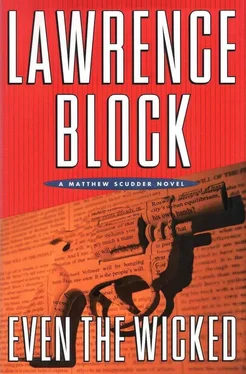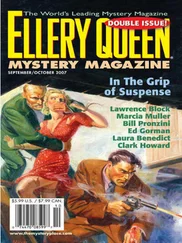“Will never wrote this letter.”
“So you said. At great length, as I recall.”
We’d spent the day in a conference room at One Police Plaza, where I got to tell my story over and over to different teams of detectives. Some of them acted respectful while others were cynical and patronizing, but whatever attitude they struck it felt as though they were acting the part. They all seemed impossibly young to me, and I suppose they were. Their average age must have been around thirty-five, which gave me a good twenty years on them.
I don’t know why they had to ask me the same questions quite as many times as they did. A certain amount of that was probably to see if I contradicted myself or offered any additional information, but eventually I guess they just settled into a routine. It was easier to go over my story a few more times than to think of something else to do.
Meanwhile, other people were off doing other things. They sent a crew to toss Adrian’s apartment and another to disrupt things at his office. His photograph went out by wire to Omaha and Philadelphia, as well as to Midwest Express’s hub city, Milwaukee. They weren’t keeping me posted, but I guess some corroborating evidence began to turn up, because there was an attitudinal shift sometime around the middle of the afternoon. That was when it began to become clear that they knew the story I’d spun for them was more than smoke.
Joe was around for the whole thing. He wasn’t always in the conference room, and at one point I thought he’d gone home, or back to his precinct. He came back, though, and he brought a sandwich and a container of coffee for me. He disappeared again after a while, but he was planted in a chair in the outer office when they finally told me to go home.
We walked a couple of blocks, passing up a few favorite cop watering holes, and wound up in the bar of a Vietnamese restaurant on Baxter Street. The place was the next thing to empty, with one man reading a newspaper at a table and another nursing a beer at the far end of the bar. The woman behind the bar looked exotic, and thoroughly bored. She fixed a martini for Joe and a Coke for me and left us alone.
Joe drank a third of his martini and held the glass aloft. “I ordered this,” he said, “not because I ever liked the taste of these things, but because after a day like today I wanted something that would hit me right between the eyes.”
“I know what you mean,” I said. “That’s why I ordered a Coke.”
“Is that a fact. Don’t tell me you never get the urge for something stronger.”
“I get lots of urges,” I said. “So?”
“So nothing.” He nodded in the direction of the bartender. “Talk about urges,” he said.
“Oh?”
“What do you figure, black father and Vietnamese mother?”
“Something like that.”
“A lonely GI far from home. A girl, young in years, but filled with the ancient knowledge of the East. Listen to me, will you? It’s funny, though. You see somebody looks exotic like that, you think it’d be special. But it’s just in your mind.”
“You’ve looked at clouds from both sides now.”
“Oh, go fuck yourself,” he said.
“Everybody tells me that.”
“Yeah, and I can see why. Here, I got a copy of this. I don’t think I was supposed to, and I know I’m not supposed to show it to you, but I’ll bet you anything it’s in the paper by morning, so why should you be the last person in town to see it?”
And he handed me Will’s letter.
“It’s all wrong,” I said. “Will didn’t write this.”
“If Will was Whitfield,” he said, “and assuming Whitfield’s not playing possum, then all of that goes without saying, doesn’t it? Of course he didn’t write it. Dead men don’t write letters.”
“They can write them before they die. He already did that once.”
He took the letter from me. “He’s got references to the column of McGraw’s that ran yesterday, Matt. And he talks about Tully’s threat of a TWU strike, and that’s only been news in the past week or ten days.”
“I know that,” I said. “There’s plenty of evidence to disprove any theory that Adrian wrote this and arranged to have it mailed weeks after his death. But suppose I never even suspected Adrian. You could still take one look at this and know that the same person hadn’t written it.”
“Oh? Style’s pretty close.”
“Will Number Two is literate,” I said. “He’s got an ear for language, and I’d guess he made a conscious effort to mimic Will Number One. I haven’t got the other letters handy to compare them, but it seems to me I can recognize phrases that I’ve read before.”
“I don’t know about that. I’d agree it has a familiar ring to it. But wouldn’t anybody copycatting Will make an effort to sound like the original?”
“Not everybody could pull it off.”
“No?” He shrugged. “Maybe it’s harder than it looks. You know, he didn’t just copycat the style of the writing. He got the rest of it right, too. See the signature?”
“It’s printed in script.”
He nodded. “Same as the others. I was talking to a couple of the guys while the rest of them were in there trying to make your head spin. I asked about the forensic side.”
“I was wondering about that,” I said. “It seems to me it shouldn’t be much of a trick to prove that the new letter was typed on a different machine.”
“Well, sure,” he said. “If it was typed.”
“If it wasn’t,” I said, “he’s got a funny kind of handwriting.”
“I mean typed on a typewriter, which it wasn’t, and neither were any of the earlier letters. They were done on a computer and printed on a laser printer.”
“Can’t they identify the computer and the printer forensically?”
He shook his head. “With a typewriter the keys’ll be worn differently, and this one’ll be out of alignment, or the E and O’s’ll be filled in. Or the typeface is different. A typewriter’s like a fingerprint, no two alike.”
“And a computer?”
“With a computer you can choose a different typeface every time, you can make the type larger or smaller by touching this key or that one. You see how the signature’s in script? You get that by switching to a script font.”
“So you can’t tell if two letters came out of the same computer?”
“I’m not a hundred percent in the loop on this,” he said, “but there’s a certain amount you can tell. With Will’s letters, the ones from Will Number One, they think there was more than one printer involved.”
He went on to tell me more than I could take in, about ways in which you could compose a letter on one computer, copy it on a disk, and then print it out through another computer and printer. I didn’t listen too closely, and eventually I held up a hand to stop him.
“Please,” I said. “I’m sick to death of computers. I can’t have a conversation with TJ without hearing how wonderful they are. I don’t care about the typeface or the paper, or if he composed it on the East Side and printed it out on the West Side. I don’t even care about the writing style. What’s so different it jumps off the page at you is what he’s saying.”
“How do you mean?”
“His list.”
“The original Will wrote open letters to the vies,” he said. “This one writes to McGraw. Plus he lists three at once.”
“Uh-huh. And look who’s on the list.”
“Peter Tully, Marvin Rome, and Regis Kilbourne.”
“Adrian picked people society couldn’t come to terms with. A child killer who got away with it. A Mafia don who got away with everything. A right-to-lifer who’d incited homicide and remained untouchable. A racist firebrand who, like the rest of them, had found a way around the system.”
Читать дальше












